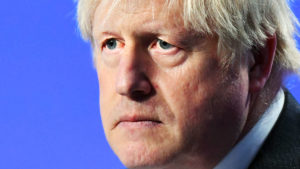When the Red Wall elected Boris Johnson, they thought they were getting an outsider who would take on the dreary consensus which has dominated Britain for 40 years. Instead, they got an establishment politician who spent much of the last year speaking to the values of metro cosmopolitans who represent neither a majority of the Conservative electorate nor the country.
The sheer scale of the disillusionment with Johnson’s premiership struck me last week as I gave various talks in Westminster and listened to MPs voicing their frustration with the direction of travel. On the surface, their demands are clear and specific. Those among the new intake — the 2019ers and Red Wallers — want Johnson’s advisors gone and No. 10 shaken up. They want the volume on Net Zero turned down and the volume on illegal migration turned up. They want Levelling-Up transformed from a narrow, hollow slogan into a serious, unifying and coherent project. And they want it done yesterday.
They also want Boris Johnson to govern as he campaigned; to spend more time outside of London, speaking on behalf of working people, taking on The Blob and offering policies that will resonate among the new Conservative voters, who not only gave him the Red Wall but lie at the heart of the realignment sweeping through the country. They complain about a Prime Minister whose talents as a campaigner and communicator are being squandered by advisors who neither understand this new conservatism nor the realignment on which it stands. This is compounded, they continue, by a Prime Minister who is simply too worried about being liked by the chattering classes and too reluctant to embrace the messaging and policies which would reinforce and retain his new electorate.
This disillusionment is reinforced by what many see as a deep generational and ideological rift inside the Conservative parliamentary party, a rift symbolised this week by one minister deriding Red Wallers as “a load of fucking nobodies”. One obvious question after the 2019 general election was how traditional True Blue free-traders would sit alongside a more blue-collar, one-nation conservatism. Fast forward to today and this rift is now on full display, reflected in the more than a few 2019ers who simply do not believe their southern, affluent and typically Oxbridge-educated colleagues are seriously invested in levelling-up the Red Wall, who they say resent the new focus on the north, who look at their party’s new blue-collar voters with a combination of bemusement and snobbery and who, they say, remain much too wedded to the old conservatism of the Eighties, failing to grasp that the rules of engagement amid the new, post-2016 politics are very different.
There are certainly Thatcherites among the Red Wallers, who look back rather than forward. But there are just as many who complain that the new, post-2016 conservatism cannot answer the questions thrown up by the realignment by turning the clock back 40 years. Thatcherism, one MP points out, represented a genuine, radical and counter-cultural pushback to the dominant zeitgeist at the time. Anchored in a specific philosophy, it offered one answer to a set of questions thrown up by the chaos, gridlock and failure of the Seventies. Today, both the questions and the answers are very different and require a different approach. We have transitioned into a politics where providing people with cultural freedom has become just as important as providing them with economic freedom — only the Conservative Party has failed to keep up.
This also finds its expression in an instinctive suspicion of whether Johnson’s leadership rivals really could maintain and continue the realignment. You do not have to travel far in Conservative circles to find people who will tell you that anybody can lead a realignment. Just put a Sunak or a Truss on top and throw the working-class northerners a bit of Red Meat. But this is a fundamental misread.
Realignments are both bottom-up and top-down. They depend on underlying demographic trends which are pushing non-graduates and workers Right-wards and graduates and professionals Left-wards; but they also depend on the leaders who pull them into politics and turn them into votes. The realignment in Scotland would simply not have been possible without Nicola Sturgeon, in the same way that the realignment in America would not have been possible without Trump.
Boris Johnson is a greatly weakened figure but he has at least demonstrated proof of concept, driving the realignment by campaigning for Brexit (liking Johnson was a significant driver of public support for leaving the EU) and then tearing through the Red Wall (liking Johnson was a significant driver of Labour to Conservative defectors). While many of the new intake loathe what has become of Johnson’s premiership, they can still sense his lingering appeal in parts of the country where, they say, other Conservatives would simply struggle if not fail to reach.
Some fear that a Prime Minister Sunak or Prime Minister Truss — neither of whom are really known outside of the Westminster village — would be unable to hold the coalition together, a coalition which Johnson himself did not simply mobilise in 2019 but over much of the last decade. While this relationship is damaged, it is also one which, like a long and difficult marriage, still has deep roots. It was shaped by Johnson’s decision to campaign for Brexit, then against Theresa May’s Soft Brexit, and then to Get Brexit Done in 2019. In many respects, in the eyes of many voters, Boris Johnson is the realignment: he is the one politician who had the courage to go against the grain and offer the country a break from the dreary, narrow orthodoxy which had dominated their lives for decades.
People have swiftly forgotten that only eight months ago, Johnson won the Labour heartland of Hartlepool for the first time in decades. He has also enjoyed major gains at local elections across Labour strongholds; it’s all strong evidence that the realignment continues and is by no means in reverse. Twelve weeks ago, the party was averaging 40% in the polls.
Could Sunak, Truss or anyone else manage to hold and extend this coalition in the two years before the next general election? Some MPs describe Sunak as George Osborne 2.0: metropolitan, slick, London, competent — but also disconnected from the blue-collar conservatives, the previously apathetic, cultural conservatives who now represent a major flank of the party’s electorate. Sunak, they worry, seems more a relic from the Osborne days, than a counter-cultural general who can rally the masses. There is a counter argument to this, of course, which is that in recent polls Sunak performs strongly across northern England, even eclipsing Johnson’s own ratings. But Sunak’s critics reply that it is easy to be popular when you have given people £70 billion of furlough and much of the country still does not know who you are or what you really believe.
The questions are obvious and difficult to answer. How would Sunak, the partner of a billionaire, a graduate of Oxford and Stanford who wears £1,300 suits and starts his days spinning on a £2,000 bicycle while eating blueberries hold the Red Wall? We hear much about his support for traditional fiscal conservatism and the picture of Nigel Lawson which hangs over his desk, but is this really what the new conservative voters want? Is politics not in a state of realignment precisely because the managerial, technocratic and polished fiscal conservatism of the Cameroon and Osborne era, along with an acceptance of progressive politics, alienated so many? And given that friends of Sunak say he routinely prioritises avoiding disagreement over pinning his own political stripes to the mast, would such an approach really work in a politics that is far more polarised, cross-cutting and rooted more strongly in values than appeals to economic competence?
These doubts, these questions, are what have so far prevented more MPs from rebelling against Johnson. But how long will that hold? So weak is the Prime Minister, that he is now only one error, one leak, one policy blunder away from losing his grip on power altogether. Furthermore, MPs worry that even a Johnson reboot — a Boris Johnson 2.0 — is pointless unless it is anchored in a guiding philosophy which can reconnect him with his new voters.
“One week it’s Net Zero and animal sentience”, complained one MP, “the next it’s tax rises.” A political project which began life by promising the British people that it would be genuinely revolutionary — that it would springboard from Brexit into far-reaching reforms which would overturn the orthodoxy and push the country in a completely new course — has instead become glaringly conventional.
Boris Johnson was never going to be an ism. But in the early days of his counter-cultural premiership there was at least a small hope that he might at least surround himself with thinkers who genuinely grasp the realignment and can feed it with a radical new offer which cuts across Left and Right in the same way Brexit disrupted the old loyalties five years earlier. Today, though, they see a Prime Minister who is bobbing on the surface, trying to be all things to all voters with no clear sense of direction or underlying purpose.
And now his core voters, the ones who really matter, have noticed too. It is the Leavers, the workers, the Greggs Guys who are abandoning him in droves, running not to Labour, but into apathy, giving up on the one person who, in 2019, like Mrs Thatcher 40 years earlier, promised them that he would shatter the consensus and radically reshape the country. The difference between Thatcher and Johnson is that only one of them followed through. “Where is that Boris?”, asked one MP.
They have a point.
Disclaimer
Some of the posts we share are controversial and we do not necessarily agree with them in the whole extend. Sometimes we agree with the content or part of it but we do not agree with the narration or language. Nevertheless we find them somehow interesting, valuable and/or informative or we share them, because we strongly believe in freedom of speech, free press and journalism. We strongly encourage you to have a critical approach to all the content, do your own research and analysis to build your own opinion.
We would be glad to have your feedback.
Source: UnHerd Read the original article here: https://unherd.com




